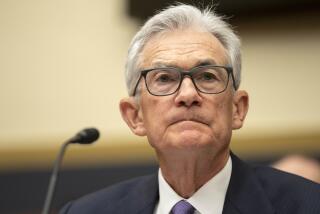Powell, Soviet Brass Bemoan Budget Slashes : Military: Top U.S. general reviews field exercises after a meeting with Gorbachev.
- Share via
NARO-FOMINSK, Soviet Union — Gen. Colin L. Powell, chairman of the U.S. Joint Chiefs of Staff, found a common language with Soviet generals Tuesday as they commiserated with each other over the budget cuts imposed on them by their governments.
After watching a dozen Soviet T-80 main battle tanks and armored fighting vehicles fire thundering round after thundering round, Powell and Gen. Anatoly N. Kleimenov, a deputy Soviet chief of staff, reminisced about the good old days--before budget cuts that followed the end of the Cold War--when they could use much more live ammunition in training exercises.
“You can afford to fire more live ammunition than we can,” Kleimenov griped. “You use three times as much ammunition as we do.”
But Powell jumped in to complain that “until they cut our budget,” American troops were also firing more live ammunition.
Then Kleimenov groaned, “Our budget was slashed even lower.”
The two men were busy comparing cutbacks when Powell realized they were surrounded by journalists and cautioned the Soviet general: “The reporters are hearing us complain about whose budget is less.”
Powell had earlier met with Soviet President Mikhail S. Gorbachev to discuss international issues on the eve of next week’s superpower summit here between Gorbachev and President Bush.
Traveling with senior commanders from the Army, Navy, Air Force and Marines, Powell was returning a visit that his Soviet counterpart, Gen. Mikhail A. Moiseyev, chief of the Soviet general staff, made to the United States last October. He is the second chairman of the Joint Chiefs of Staff to visit the Soviet Union.
Powell, who had met Gorbachev several times previously as a White House official, refused to disclose the content of his discussions with the Soviet president.
But Vitaly N. Ignatenko, Gorbachev’s press secretary, told reporters that the president and Powell discussed the conversion of military industry to produce civilian goods and the role that Soviet and U.S. military leaders had played in concluding agreements to reduce both nuclear and conventional arms.
While Gorbachev praised the recent successes in arms reductions, some of his generals said the Soviet military has been hard pressed to make the cutbacks agreed in the treaty reducing the conventional armed forces in Europe; they also complained that the withdrawal of Soviet troops from Eastern Europe has been a tremendous burden.
Gen. Vladimir P. Chuzhipov, the commander of Kantemirovskaya Tank Division, which Powell visited, said that the most challenging problem he faces is trying to house the troops returning from former Warsaw Pact countries.
“The pullout is proceeding much faster than we can cope with it,” Chuzhipov said.
During a day of visits to training facilities to watch mock battles and demonstrations of Soviet high-tech weaponry, Kleimenov paused at one point in front of a sophisticated BTR-80 fighting vehicle and sighed, “I cannot order any more because I’m limited by (the treaty reducing conventional forces).”
Powell chirped back: “Then I’m saving you money.”
The generals had started their discussion over pastries and tea in a camouflaged outdoor cafe complete with pink umbrellas and tablecloths at the tank base, about 45 miles southwest of Moscow.
“A simple soldiers’ mess,” Powell joked.
Soviet generals stressed to Powell that in recent years, their tactics have shifted dramatically. Earlier, the great majority of training scenarios were aimed at offensive strategies, but now 70% are defensive, Kleimenov said.
Powell said he had “excellent discussions” about the Soviet Union’s shift to defensive strategies earlier in the week with Moiseyev.
“At the same time,” Powell added, “a tank is a tank is a tank. A tank that is used for defensive purposes can also be used for offensive purposes. And so can an armored combat vehicle. But that’s the same in our army as well.
“I think it’s the hope of both of the sides that we will have these systems for only defensive purposes from now on.”
Powell, an infantry officer who fought in Vietnam, seemed more impressed by the soldiers and their disciplined sharpshooting than by the tanks and other heavy equipment.
During a dramatic display of marksmanship at the Tamanskaya Infantry Division, a soldier shooting a wire-guided antitank missile from a foxhole impressed Powell because--instead of panicking when he misfired with the top brass watching--he started his drill from the beginning and fired again, this time successfully.
“He did not lose his poise,” Powell said, praising the soldier. “I’ve been in situations before where the whole world is watching and something goes wrong.”
Comments made by generals from both countries made it clear that huge chasms still exist between the U.S. and Soviet armed forces.
While the U.S. generals praised the merits of a volunteer army, Soviet generals seemed unwavering in their commitment to mandatory service.
“As I look and listen and watch them fire,” Col. Richard Chilcoat, Powell’s executive officer, said after a dramatic display of grenade launchers and antitank guns, “there is no doubt that . . . we have better training and our technology is superior.”
But one of the most striking differences came out during a discussion about women in the military. While U.S. generals talked about the growing role for women in the armed services, Chuzhipov said there are only 100 women in his division of 9,000, and he indicated that even that might be too many.
“Women were created to be mothers--to continue life and not to destroy life,” Chuzhipov said. “A woman, who is made to give life, should not take up arms to destroy it.”
But Powell tried to avoid the differences and stress what the Soviet and U.S. military forces have in common.
“I feel very at home with what I saw,” Powell said at the end of the day. “The weapons are different--I see Kalashnikovs instead of M-16s, I see BMPs instead of Bradleys--but otherwise, it’s the same. I see good soldiers doing their job to defend their homeland.”
More to Read
Sign up for Essential California
The most important California stories and recommendations in your inbox every morning.
You may occasionally receive promotional content from the Los Angeles Times.













